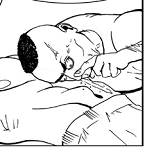|
rizuhbull posted:2005 Honda Civic. 60k miles. Go for it, even 7th gen Civics are ridiculously easy to work on. https://www.youtube.com/watch?v=CxKsGXhOc7o Worst case scenario, you fail, return the part you bought with the rented tool, and bring it to the mechanic to do it for you. E: Even if you gently caress up really bad somehow, the car can and will run without the sensor. It'll ruin your gas mileage and damage your engine longterm, but it'll easily limp a few miles to a mechanic The Door Frame fucked around with this message at 21:19 on Oct 4, 2016 |
|
|
|

|
| # ? May 28, 2024 22:01 |
|
Look at the pigtail routing before you remove the sensor. If it's not touching anything, route the sensor the same way when you put on the new sensor. Denso is the OEM sensor so get that one. Put antiseize on the threads before you install. If you see damage on the pigtail that looks like abrasion, try routing the pigtail in a way where it doesn't touch anything.
|
|
|
|
And wait for the car to be cool before you do anything. Should be obvious, but this is a job after the car has sat for a few hours.
|
|
|
|
Oh yeah, that's an important detail that most people probably take as rote. That heatsheilding gets really loving hot, really loving fast. Within the time it takes me to cold-start the car and then walk over to look at the engine bay, the heatsheilding is already uncomfortably warm to the touch
|
|
|
|
Thanks everyone. I bought the part from Autozone $159 because I rather just do it tomorrow than wait for shipping and borrow a relative's car. The sensor has a plastic cap on it so I'm assuming it already has anti-seize grease applied? Didn't know I needed it until after I got home. Also think I can still head to the gym tonight? I've read that it gulps down gas (which I'm not too concerned about with one 5 mile trip), but that it also damages your catalytic converter, which I am worried about.
|
|
|
|
Yeah it'll have antiseize on it. You can probably see it on the threads under the cap.
|
|
|
|
I'm heavily considering a 2004 BMW M3. The car has listed 5 owners on the Car Fax though the last 2 owned the car for 3.5 and 2.5 years respectively before being sold to a used dealer. The car has low mileage (66k) for it's age. My concern is the Car Fax shows 2 accidents both form the same owner within a month of each other back in 2005. The first was "Accident reported Involving left front impact Vehicle functional" and the second "Accident reported Involving right side impact Disabling damage reported". All other things considered the car looks to be in great shape, it's had it's service inspection 1 done by BMW along with other maintenance along the way. Should I steer clear of this car? It happened 11 years ago so I feel like any real structural issues would have been caught but I could just be turning a blind eye. There is no salvage or wreck on the title but I hear there are ways to get around this by moving it between states. It went from Florida to Indiana a year after these incidents.
|
|
|
|
|
I'm not a car at all, but I'm tired of paying money for something as simple as swapping out winter tires. The dealer charges $60 a vehicle, and even the local tire shop is $45. I figure the tools will pay for themselves in a year or two tops. Having said that there are a few little things that I just want clarification on: - Are any torque wrenches under $100CDN worth buying? There are a ton around $50CDN on Amazon but I assume they are cheap crap. Links to anything decent on Amazon, eBay, whatever are appreciated. - My driveway has a decent slope and my garage is a woodshop that will no longer fit a far without moving 2000lbs of cast iron equipment, so I know I need wheel chocks or something, but what sort of jack should I use? As above links are appreciated. - My Genesis has TPMS sensors on both the summer and winter tires. Do you need to do anything with the TPMS system when the tires are swapped or will it just work? - If the tires need to be topped up is there any issue adding air to nitrogen filled tires? - Any harm in rotating the tires each time I swap out winters/summers? These are really stupid questions, I know. I love driving but this is my first step into basic maintenance beyond changing air filters.
|
|
|
|
Nitrogen in tires: You can mix air and nitrogen all you want, no ill effects. Only if you drive an Airbus or a Boeing is nitrogen is required by the manufacturer!
|
|
|
|
TKIY posted:- Are any torque wrenches under $100CDN worth buying? There are a ton around $50CDN on Amazon but I assume they are cheap crap. Links to anything decent on Amazon, eBay, whatever are appreciated. If you're just doing wheels pretty much any torque wrench will do. You don't have to be absolutely precise - being in the ballpark of the torque spec is important, and being consistent matters most. As long as your wrench hits within roughly 10% of whatever you set it to and does so consistently you're fine. TKIY posted:- My driveway has a decent slope and my garage is a woodshop that will no longer fit a far without moving 2000lbs of cast iron equipment, so I know I need wheel chocks or something, but what sort of jack should I use? As above links are appreciated. Doing any work that requires lifting the car and removing wheels on an incline is frowned upon. For your application this would probably result in dropping the car on a rotor or two, but losing toes, a foot or even part of yours leg wouldn't be out of the question. Also jacks are for lifting, jackstands are for supporting the vehicles - same consequences as above apply here. Look for a hydraulic jack and two jackstand combo. TKIY posted:- My Genesis has TPMS sensors on both the summer and winter tires. Do you need to do anything with the TPMS system when the tires are swapped or will it just work? Can't speak to your specific model but generally there's a pairing procedure that you'll probably have to go through when swapping out between seasons. TKIY posted:- Any harm in rotating the tires each time I swap out winters/summers? As long as you're not putting a stupid number of miles/kms on it between changes, sure.
|
|
|
|
rizuhbull posted:Thanks everyone. For some reason Bosch O2 sensors and Hondas have never played nice together, in my own experience. If you haven't installed it yet, take it back if you got the Bosch. As newbie pointed out, Denso is the OEM, and is the best choice. NTK is also a good choice and works great in Hondas, and Autozone often has them in stock. Bosch is something I would only use in a car where Bosch was the OEM (so most German stuff, and oddly enough, my old Nissan had a Nissan logo next to a Bosch logo on the original sensor) A few miles isn't going to hurt anything. I wouldn't drive it for months like that, but unless you're driving a ton, shipping time for a Denso or NTK sensor won't be the end of the world for the cat. It definitely will drink a lot more gas though; when the O2 sensor went in my 96 Civic, it went from ~30 MPG to about 18. 
|
|
|
|
Well, Bosch only makes planar sensors and Denso only makes thimble type sensors (NTK makes both). I don't know if ECUs are smart enough to figure out the difference but they're different. If the ECU can't differentiate then and/or have the right calibration for it then there could be problems, if only with the heater control. With O2 sensors, because there's so much calibration involved, I would stick with the OEM supplier.
|
|
|
|
Geoj posted:If you're just doing wheels pretty much any torque wrench will do. You don't have to be absolutely precise - being in the ballpark of the torque spec is important, and being consistent matters most. As long as your wrench hits within roughly 10% of whatever you set it to and does so consistently you're fine. For your use case, Harbor Freight (or Princess Auto, I suppose) can probably be a one stop shop. The HF torque wrenches are actually remarkably accurate for the money, and are likely perfectly fine for anything that isn't rebuilding the bottom end of an engine. Likewise their jacks are all highly rated. I would personally avoid any of the tiny little "trolley" jacks that are often bundled with jackstands, but anything larger should be fine. Jackstands, just avoid anything made of thin sheet metal. They have mostly disappeared from stores by this point anyway. A proper cast and/or thick sheet metal stand is barely any more expensive and much safer. As far as working on an incline, it depends on how much of an incline. My driveway is very lightly sloped and I use it for the majority of my car work because my C10 is taking up the garage. But always, ALWAYS, give the car a solid shove or three once you get it on the stand(s). If it looks or feels sketchy, it probably is. Find your owner's manual and look for jacking / lifting instructions in it. If you're lucky you will have a solid point in the center of the front and rear ends you can use the jack to lift from, and then you put the stands underneath the lift points for the emergency jack.
|
|
|
|
rizuhbull posted:The sensor has a plastic cap on it so I'm assuming it already has anti-seize grease applied? When I have got new o2 sensors, name-brand sensors usually come with anti-seize while noname ones often do not. If/when you have problems getting the 10 year old sensor out, it is sometimes easier to heat the exhaust up to get it to break free. If you do that, be very careful and try to avoiding burning yourself more than once or twice. You don't need to tighten the new sensor nearly as much though. You should look up the specs for your model, but most I've seen are in the neighborhood of 30-40Nm. Just a little bit more than a spark plug, really.
|
|
|
|
Chock the resting wheels as well.
|
|
|
|
rizuhbull posted:2005 Honda Civic. 60k miles. I have the same car and did the same job a few months ago. It is stupid easy. Just use a wrench to get it loose, apply anti seize to threads of new Denso sensor, and screw it back in.
|
|
|
|
Popete posted:I'm heavily considering a 2004 BMW M3. The car has listed 5 owners on the Car Fax though the last 2 owned the car for 3.5 and 2.5 years respectively before being sold to a used dealer. The car has low mileage (66k) for it's age. I can't help you about this car specifically, but I will suggest that anything that has had a bang should be looked at by a good mechanic to tell you the true state of it. Don't rely on the fact that it's been driven for 11 years as any indication of condition. One thing we've learnt from the Mechanical Failures thread is that people will drive a car until the wheels literally fall off or the oil-free engine melts into a solid lump and have no idea that anything is wrong.
|
|
|
|
Also cars that have had collision damage may look alright, but have structural issues making them very dangerous if they have another more serious accident.
|
|
|
|
Okay thanks for the advice. Sounds like I'm shopping for a torque wrench, jackstands and chocks then. I have no idea exactly what the incline on the driveway is but it's lesser towards the street so I can always change the tires on the flatter portion and will make sure it's stable before doing anything. edit: So after searching, apparently there are *not* centre lift points front and rear on my 2015 Genesis sedan. Most guys jack the rear by lifting the differential housing and that just seems like a bad idea. If I can only lift one wheel at a time I'm not sure how to get a jack stand in there since I will be using the jack on the lift point at that time :/ Is there a 'locking' style of jack or something that will be safest to use? I'm looking at this jack: https://www.amazon.ca/Powerbuilt-640181-Garage-2-Ton-Trolley/dp/B000H4I5VK/ Can you leave the car jacked up on it while you do the tire or am I crazy thinking that you don't want to support the car on something that has swivel casters... The other three tires will still be on the ground so I don't know if that helps or not. TKIY fucked around with this message at 15:20 on Oct 5, 2016 |
|
|
|
Anyone with Acura TSX 2nd gen experience who can tell me how involved and time-consuming it is for a limited-experience non-mechanic to remove the exhaust manifold (4-cyl VTEC) to get better access to the starter for replacement? I don't know that I'd have time to do this, and service manual shows no special torques or anything, but seems like it will take twice as long to get to and replace a starter. Seems like every time I get one thing fixed, I leave the shop with a new problem, case in point, starter screeching now after having brakes done, and the car takes 5-7 tries to start.
|
|
|
|
life is killing me posted:Anyone with Acura TSX 2nd gen experience who can tell me how involved and time-consuming it is for a limited-experience non-mechanic to remove the exhaust manifold (4-cyl VTEC) to get better access to the starter for replacement? I don't know that I'd have time to do this, and service manual shows no special torques or anything, but seems like it will take twice as long to get to and replace a starter. I've done this job on an accord with a k24 engine, and it was a pain. It's the intake manifold on that engine, which I assume you have as well. The main issue I had is I didn't want to remove coolant lines from the manifold, which makes the fit even tighter. A swivel head wrench is almost guaranteed needed to work in the tight areas, working down between the cylinder head and the half off manifold. I would scope it out on YouTube and see if it fits your skill level.
|
|
|
|
TKIY posted:Can you leave the car jacked up on it while you do the tire or am I crazy thinking that you don't want to support the car on something that has swivel casters... The other three tires will still be on the ground so I don't know if that helps or not. If you are just changing the tires and in no way getting in under the car, it should be fine. However, if the driveway is more than very little inclined, I would rather go do it somewhere flat though. Depending on suspension travel, weight distribution and jacking point, you may very well see two wheels come off the ground even if you're jacking pretty near a corner, which will make things less stable. If you're uncertain, wiggle the car about a bit after jacking it up but before taking the tire off. Don't jack it up higher than you need, it's obviously less stable the higher up you go. It also helps if you crack the bolts/nuts loose before jacking it up, and do the final tightening after taking it down. Jumping on a breaker bar to get a wheel nut off while car is jacked up is a good way to have it fall down.
|
|
|
|
ionn posted:If you are just changing the tires and in no way getting in under the car, it should be fine. However, if the driveway is more than very little inclined, I would rather go do it somewhere flat though. Depending on suspension travel, weight distribution and jacking point, you may very well see two wheels come off the ground even if you're jacking pretty near a corner, which will make things less stable. If you're uncertain, wiggle the car about a bit after jacking it up but before taking the tire off. Don't jack it up higher than you need, it's obviously less stable the higher up you go. It also helps if you crack the bolts/nuts loose before jacking it up, and do the final tightening after taking it down. Jumping on a breaker bar to get a wheel nut off while car is jacked up is a good way to have it fall down. Okay that makes sense. Thanks!
|
|
|
|
PaintVagrant posted:I've done this job on an accord with a k24 engine, and it was a pain. It's the intake manifold on that engine, which I assume you have as well. The main issue I had is I didn't want to remove coolant lines from the manifold, which makes the fit even tighter. A swivel head wrench is almost guaranteed needed to work in the tight areas, working down between the cylinder head and the half off manifold. Yeah it's a k24z3. Being told by some folks on another forum that I'm a pussy and I should just go ahead and do it myself with no experience with this engine. Could I do it? Sure I could. Could I do it quickly, and not take up a whole weekend? Eh. I don't have the tools to do it really, I only keep a small set of 1/4in drive sockets with a small ratchet, some screwdrivers and a couple hammers and a drill. Also I don't have the time relative to my skill level. I'll check out a video as I've seen one, it's 19min long so that's promising? I hate to remove the intake manifold (my bad, I said exhaust manifold but was thinking of the intake manifold) to do the starter but apparently it must be done. A few posters on a TSX enthusiast forum recommended in an older thread (there are two big forums for TSX and TL and neither is very active) that the radiator also be removed (optional) to have more room to work with, and I feel like I'd have to remove it because I have large hands and, again, little experience to know where to put my hands to do this job without having to remove the radiator. I'm a rotary wing aircraft mechanic, but a car mechanic I am not. I'd have more trouble remembering what vacuum hose goes to what, but labeling those is easy enough. life is killing me fucked around with this message at 16:03 on Oct 5, 2016 |
|
|
|
TKIY posted:Okay that makes sense. Thanks! You can use just the jack to support the weight, with a jack stand under something solid (like a suspension mounting point) as backup That way, the jack is probably going to be fine to support the weight, but if something untoward happens, the car will drop a short distance onto the jackstand - rather then slamming to the ground and breaking something or squashing a bodypart
|
|
|
|
spog posted:You can use just the jack to support the weight, with a jack stand under something solid (like a suspension mounting point) as backup I'll have to take a look at the owners manual again to see where the backup could be. There's really nothing in it which is annoying. I was going to order some jack stands just in case anyhow.
|
|
|
|
TKIY posted:I'll have to take a look at the owners manual again to see where the backup could be. There's really nothing in it which is annoying. I was going to order some jack stands just in case anyhow.  http://www.gencoupe.com/diy-do-yourself/419473-how-jack-car-up.html http://hyundai.wikia.com/wiki/Jacking_Up_Your_Car You'll need a hockey puck for your trolley jack if you go under the sills as it looks like you're jacking on welds. Always use jack stands as a backup.
|
|
|
|
The coupe and the sedan are totally different. I'm finding lots of info on the coupe but Google is failing me on the sedan.
|
|
|
|
There's probably other places you can lift the car besides the official jack points specified in the owner's manual. Look for reinforced areas, rails that run front to back (usually to either side of the driveshaft/exhaust tunnel) or if nothing else you should be able to lift the front using the crossmember. I'm trying to find an underbody shot of a Genesis sedan on Google and all that's turning up are Genesis coupe pictures. Do the two share a common platform?
|
|
|
|
Geoj posted:I'm trying to find an underbody shot of a Genesis sedan on Google and all that's turning up are Genesis coupe pictures. Do the two share a common platform? Nope, completely different but the coupe is a far more common car. I'm having the exact same issue finding info or pictures. This shouldn't be this complicated but I'm not prepared to compromise safety just to save a few bucks and a few hours twice a year. I've posted on a Genesis owners forum as well but haven't had any luck either. Part of the issue is that the entire underbody has sound reducing/wind resistance plates attached to it so much of the underbody is covered. Thanks for all the help and advice though, I really appreciate it!
|
|
|
|
TKIY posted:Nope, completely different but the coupe is a far more common car. I'm having the exact same issue finding info or pictures. This shouldn't be this complicated but I'm not prepared to compromise safety just to save a few bucks and a few hours twice a year. I've posted on a Genesis owners forum as well but haven't had any luck either. http://www.hyundai-forums.com/rb-2012-accent/133108-floor-jack-lift-point.html Okay, it's an Accent, but I bet your car has got the same jack points on the seams and some similar-looking solid metal lumps underneath to put a jackstand under. Alse shows you what the hockey puck should look like
|
|
|
|
I called my mechanic and he expressed skepticism that my problem is the starter, stating that he's never heard a starter screech before, they usually just click when they are going kaput. He said he's heard alternators screech before. Meh. I'm just taking it in to have it diagnosed so I know for sure instead of buying a starter and getting that work in to replace the starter only to find out I wasted my time because it wasn't the starter.
|
|
|
|
How will I know if my replaced oxygen sensor is working correctly?
|
|
|
|
The CEL will turn off. I think.
|
|
|
|
TKIY posted:- Any harm in rotating the tires each time I swap out winters/summers?
|
|
|
|
Invalido posted:Assuming your vehicle is front wheel drive your front tires will wear significantly faster than the rear ones (they do all of the acceleration, most of the braking and cornering, probably have a bit more weight on them too). For economical reasons it makes sense to rotate them so all four tires wear out at the same time. What you want to avoid however is to have rear tires significantly more worn than the front ones, since that setup will make the car prone to oversteer when grip is marginal. Rotating is good if done often enough, but potentially bad if done too rarely and the wear has gotten too uneven between front and rear. It's easy enough to measure the thread depth to make an informed decision of which tires should go where when doing the biannual swap. It's actually AWD and I only put on maybe 15k km a year. Winters are directional though so I know I can only rotate them front to back.
|
|
|
|
TKIY posted:It's actually AWD and I only put on maybe 15k km a year. Winters are directional though so I know I can only rotate them front to back. The benefit of rotating diagonally never was obvious to me, unless there's an alignment problem maybe? I've never changed tires on an AWD. My own cars have all been FWD. For comparison my former company car was RWD, had a powerful-ish engine and I drove it hard whenever conditions allowed. It wore about even. I'd hazard to guess that most AWD vehicles still wear faster in the front, but the only way to be sure is to measure. Vernier caliper depth probe if you wanna be fancy but a simple measuring stick will do too.
|
|
|
|
I've been a driving a Honda for 11 years now, and my wife went through college in a raggedy but reliable Corolla and moved up to a Camry when she started work. I've been working on both cars and am pretty familiar with Hondas and Toyotas, but we've got the third child on the way and we're looking at Odysseys and Siennas, but even used ones are still breathtakingly expensive. A dealer we've been browsing at popped up with a 2016 Nissan Pathfinder S with only 7k miles on it and they want 25.5k for it (as opposed to 30 and 32k for two and three year old Odysseys with 40-50k on them. Realizing that that particular Pathfinder has so many fewer of the bells and whistles that the minivans have, what I don't know is diddly about Nissans. Are they reliable? Expensive to work on?
|
|
|
|
scuz posted:The CEL will turn off. Can confirm.
|
|
|
|

|
| # ? May 28, 2024 22:01 |
|
rizuhbull posted:How will I know if my replaced oxygen sensor is working correctly? The CEL will turn off, usually after ~3 driving cycles (a driving cycle is get in, start engine, drive somewhere, turn engine off, in some cases let engine cool off) and/or after the ECU has completed all its emissions monitor tests, which depends on the make, model, and year of the vehicle in question and how exactly the OEM implemented their OBD system. Also, if it was the upstream, you'll probably get somewhat better fuel economy and the engine will run better. Unless that actually wasn't the problem, in which case everything will be exactly like it was before you replaced the sensor.
|
|
|



























